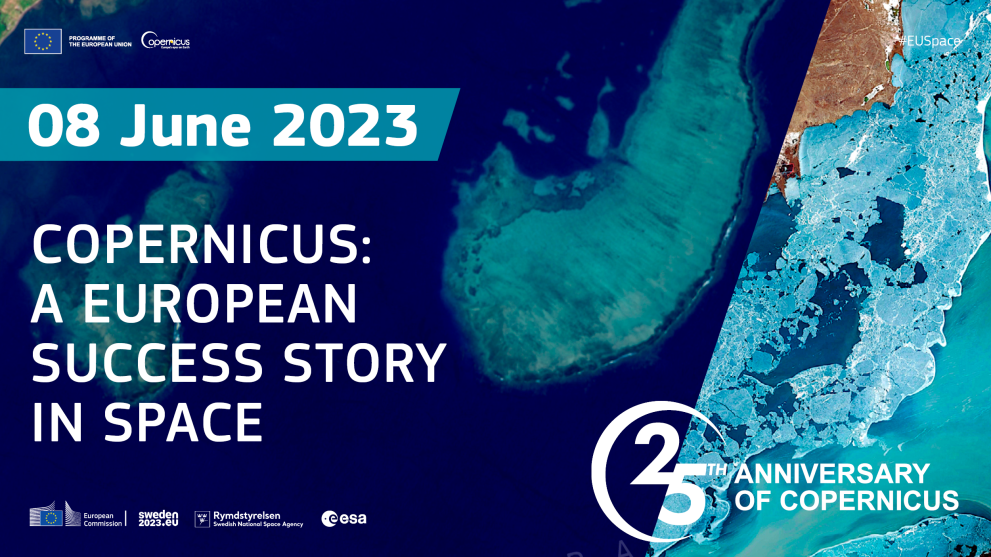
Copernicus is the Earth observation component of the EU Space Programme, dedicated to monitoring our planet and its environment. Copernicus started in 1998 and was known as the Global Monitoring for Environmental Security (GMES).
Since then, Copernicus has become one of the most ambitious and successful Earth observation programmes worldwide. It offers advanced free-of-charge information services that draw from satellite Earth observation and in-situ (non-space) data. Across six thematic streams, the Copernicus services transform this data into value-added information for its rapidly growing user community.
To celebrate the 25th anniversary of the Copernicus programme, a series of live-stream events are organised across Europe. The main event is taking place in Stockholm, Sweden, and gives the spotlight to Copernicus’ users and the programme’s success stories in areas ranging from civil protection to climate, land and marine monitoring.
Under the Horizon Europe programme, HaDEA is funding research projects to support the evolution of the Copernicus services in line with evolving user requirements, EU policy needs and state-of-the-art methodologies.
Take a closer look:
- CORSO contributes to the implementation of the new European anthropogenic CO2 emissions Monitoring and Verification Support capacity (CO2MVS) in the Copernicus Atmosphere Monitoring Service (CAMS). It will deliver capabilities at global and local scale to optimally use observations of co-emitted species. The project will also assess the added-value of in-situ observations of specific additional atmospheric species and satellite observations of the land surface to better separate the impact of fossil fuel and biospheric fluxes on atmospheric CO2.
- CERISE will enhance the quality of the Copernicus Climate Change Service (C3S) reanalysis and seasonal forecast portfolio, focusing on land–atmosphere coupling. It will develop new and innovative data assimilation approaches and land surface initialisation techniques to pave the way for the next generations of the C3S reanalysis and seasonal prediction systems. The project will also integrate Artificial Intelligence (AI) to ensure optimal data fusion.
- NECCTON seeks to build new and innovative models that will accurately simulate the functioning of the marine ecosystem. The project will enable the Copernicus Marine Environment Monitoring Service (CMEMS) to deliver novel products for marine biodiversity conservation and food resources management.
- EvoLand focuses on five key thematic domains: agriculture, forest, water, urban, and general land cover. It will develop eleven new product candidates for the Copernicus Land Monitoring Service (CLMS), using innovative approaches in data fusion, continuous monitoring, AI, biomass mapping, and via the integration of novel Earth observation and in-situ data.
- CENTAUR aims to boost Europe’s resilience to climate change threats by developing and demonstrating new service components for the Copernicus Emergency Management Service (CEMS) and the Copernicus Security Service. The project will enhance the services’ capacity to characterise urban floods, as well as water and food insecurity events.
- ACCIBERG will enhance the forecasts of Arctic sea ice and ocean parameters and their uncertainties in both Copernicus Marine (CMEMS) and Climate Change services (C3S). The project will develop a new iceberg forecasting service by building on advanced methods for sea ice and ocean modelling, remote sensing, data assimilation and cloud computing.
Background
Copernicus is the European Union's Earth observation programme and a true European success story in space. As a leading provider of Earth observation data, it provides vast amounts of global data from satellites (including the Sentinels), as well as from ground-based, airborne, and seaborne measurement systems.
Under Horizon Europe Cluster 4 – Space, HaDEA is funding projects that prepare future evolutions of the EU Space Programme components, including Copernicus. These efforts build on the extensive portfolio of EU-funded research projects supporting the Copernicus services since the 7th Framework Programme (FP7).
On 8 June 2023, the Swedish Presidency of the Council of the European Union and the European Commission in partnership with the European Space Agency (ESA), and the Swedish National Space Agency are organising a high-level event to celebrate the 25th anniversary of Copernicus.
Relevant links
Details
- Publication date
- 8 June 2023
- Author
- European Health and Digital Executive Agency
- Programme Sector
- Space
- Programme
- Horizon Europe
- Horizon Europe Cluster 4: Space
- Tags
- AWP
- Digital technology
- Digital transformation
- EUFunded
- Event
- Innovation
- Scientific research
